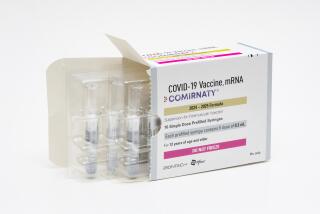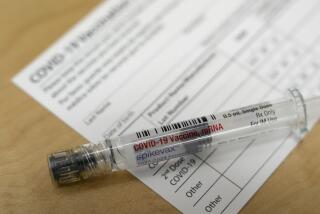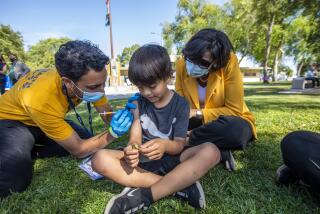Sebelius calls for updated vaccine making process
- Share via
WASHINGTON — Health and Human Services Secretary Kathleen Sebelius told Congress on Wednesday that delays in the release of H1N1 flu shots show that the United States is too dependent on other countries for the manufacture of vaccines and that the technology to make them must be improved.
Four of the five manufacturers of H1N1 vaccines are foreign companies -- a fact that alarmed lawmakers, who expressed concern about the ability of the federal government to secure enough vaccine to prevent the spread of the virus, known as swine flu.
Some expressed even greater concern that the lag in vaccine production could mean the H1N1 flu shots would arrive too late to do any good, citing a recent study that predicted that swine flu infections would reach their peak this week.
The study by researchers at Purdue University in Indiana projects that 63% of the U.S. population will be infected by the end of this year, with 8% being infected this week.
“H1N1 is very contagious,” said Sherry Towers, a Purdue graduate student in statistics and coauthor of the study.
Officials had originally projected that 40 million doses of the vaccine would be available by the end of October, but because of what Sebelius called “glitches” in manufacturing, just 11 million doses have been made available. Officials estimate that 28 million to 30 million doses will be available by the end of the month.
Sebelius said the U.S. is “at the front of the line” in getting the vaccines as they’re produced but noted the country needs to expand its manufacturing capacity.
“We are still too dependent in the United States on vaccination production in other countries,” Sebelius said at a hearing on the topic.
Vaccine manufacturers worldwide are “using old technology,” Sebelius explained, stressing the need to convert from egg-based to cell-based vaccine development.
The good news, she said, is that original projections requiring 40 million doses of the vaccine were developed when scientists had expected that adults would need two shots. Since then, researchers have found that just one dose is required for people older than 10, meaning that the available doses will be spread across more of the population.
“There is enough vaccine, and will be, to vaccinate every American who wants to be vaccinated,” Sebelius said.
Fewer than half of Americans get flu shots yearly, even though seasonal flu kills 36,000 people annually, she said.
She added that she expects the number of people getting vaccinated to increase this year because of high public awareness of the H1N1 virus.
The flu, including cases involving H1N1, has been blamed in about 2,300 deaths in the U.S. since Aug. 30.
--
Mark Silva in the Washington bureau contributed to this report.
More to Read
Sign up for Essential California
The most important California stories and recommendations in your inbox every morning.
You may occasionally receive promotional content from the Los Angeles Times.










